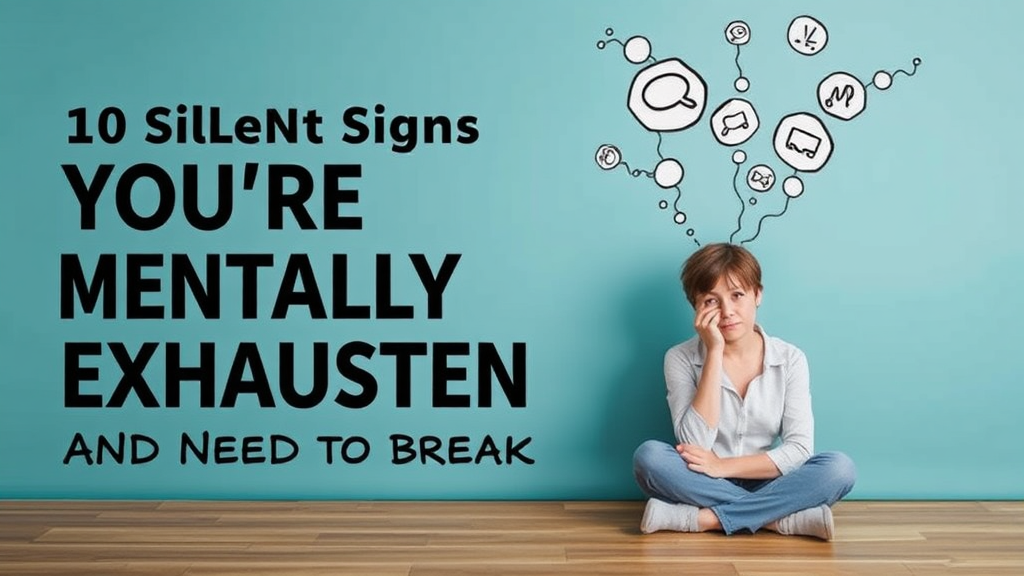
Mental exhaustion can sneak up on you when you least expect it. Unlike physical tiredness, which is often easy to spot, signs of mental exhaustion and burnout tend to be subtle and easy to ignore. You might chalk them up to ‘just being busy’ or feel like you simply have to push through. But the truth is, your mind needs rest just as much as your body. Recognizing these silent signs early can help prevent long-term damage to your well-being.
What Is Mental Exhaustion?
Mental exhaustion, often closely tied to burnout, happens when your brain has been under prolonged stress. This can be due to work pressure, emotional strain, or juggling too many responsibilities without enough recovery time. The symptoms can affect not only your mental performance but also your emotional stability and physical health.
Why It’s Important to Watch for the Signs
Ignoring early signs of mental exhaustion and burnout can lead to more serious issues down the line, including chronic fatigue, anxiety disorders, or even depression. Catching the symptoms early gives you a better chance of recovering quickly and avoiding long-term consequences.
10 Silent Signs You Might Be Mentally Exhausted
1. Constant Fatigue Despite Adequate Sleep
If you’re getting seven or eight hours of sleep but still wake up feeling drained, mental exhaustion could be the culprit. Unlike sleep deprivation, this type of fatigue doesn’t go away after a good night’s rest. Your brain may be working overtime even when your body is resting.
2. Reduced Motivation
Have you lost interest in activities you once enjoyed? Struggling to complete everyday tasks or find motivation can be a strong indicator of burnout. When your mental energy is depleted, everything can feel like an uphill battle.
3. Frequent Headaches or Muscle Tension
Physical symptoms like headaches, neck tightness, and back pain can be signs of mental exhaustion. Your body and mind are closely linked. Stress and burnout often manifest in physical discomfort when left unaddressed.
4. Increased Irritability
If you find yourself snapping at loved ones or becoming frustrated over minor issues, you may be mentally exhausted. Emotional regulation takes brain power, and when you’re depleted, small problems can feel overwhelming.
5. Difficulty Concentrating
Struggling to focus, forgetfulness, or spacing out more than usual are all warning signs. When your mental resources are stretched too thin, your cognitive functions—like memory and attention span—begin to suffer.
6. Feeling Detached or Emotionally Numb
Mental exhaustion can leave you feeling emotionally disconnected. You might not be able to fully engage with people or experiences, which can then contribute to feelings of loneliness and dissatisfaction.
7. Sleep Disruptions
Ironically, another clue that you’re mentally exhausted is trouble sleeping. Racing thoughts, anxiety, or waking up throughout the night can be signs that your mind hasn’t had a chance to slow down and recover.
Follow our social media to get an daily update!
8. Decline in Work Performance
Missing deadlines, making unusual errors, or struggling to concentrate during work tasks could be more than a productivity slump. These are classic signs of burnout affecting your professional life.
9. Escapist Behavior
When you’re mentally drained, you might find yourself binge-watching shows, scrolling endlessly through social media, or resorting to junk food or alcohol more often. These behaviors can be a way to avoid dealing with overwhelming emotions or stress.
10. Feeling Constantly Overwhelmed
Even the simplest tasks can feel like too much when you’re mentally exhausted. If your to-do list feels insurmountable and you constantly feel like you’re under pressure, it’s time to pause and reassess.
What Causes Mental Exhaustion and Burnout?
Knowing the causes behind mental exhaustion can help you make informed changes. Some of the common triggers include:
- Long-term stress at work or school
- Lack of work-life balance
- Emotional strain from relationships or caregiving
- Perfectionism or unrealistic expectations
- Chronic exposure to information overload
Identifying which sources are contributing most to your stress is the first step toward creating change.
How to Recover from Mental Exhaustion
Fortunately, recognizing you’re burned out is the first step toward healing. Here are some proven ways to recover and protect your mental energy:
1. Prioritize Rest and Recovery
Take regular breaks during your day. Whether it’s a five-minute walk, a power nap, or a weekend off social media, any effort to give your brain downtime helps it recharge.
2. Set Healthy Boundaries
Practice saying no when your schedule is overloaded. Setting boundaries at work and in personal life is essential to prevent further burnout.
3. Engage in Mindful Activities
Meditation, breathing exercises, or even mindful journaling can help reduce stress levels and improve your capacity to focus.
4. Seek Social Support
Talk to friends, family, or a therapist. Sometimes just verbalizing your feelings can bring relief and a fresh perspective.
5. Reassess Your Priorities
Ask yourself what truly matters most right now. You may not need to conquer every task—just the ones that align with your values and well-being.
Protecting Your Mental Health Moving Forward
Once you’ve recovered from mental exhaustion, it’s important to stay proactive. Regularly check in with yourself, manage your schedule wisely, and ensure you’re taking time to do things that replenish your energy: spending time in nature, connecting with loved ones, pursuing hobbies, or doing nothing at all without guilt.
If symptoms of mental exhaustion and burnout persist or interfere significantly with your daily life, consider speaking with a qualified mental health professional for guidance and support. This article is for informational purposes and does not replace professional advice or diagnosis.
Final Thoughts
Spotting the early signs of mental exhaustion and burnout can make a real difference in how quickly you recover and protect your overall well-being. By paying attention to what your body and mind are telling you, you give yourself the best chance to rest, reset, and return refreshed. Remember, taking a break isn’t a sign of weakness; it’s an act of self-care and strength. So when your mind starts waving red flags, listen—your future self will thank you.



